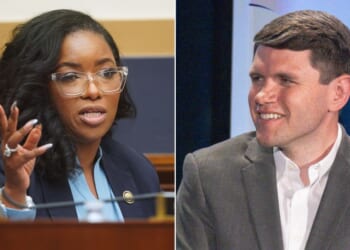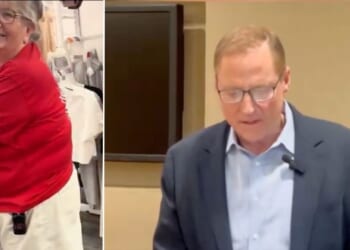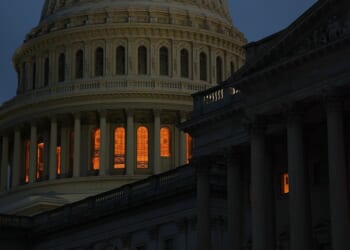
The old adage about playing “good cop, bad cop” to elicit a result offers a metaphorical counterpart in an ongoing challenge to EPA approval processes for new chemicals under the Toxic Substances Control Act (TSCA). Enacted during President Trump’s first administration to impose stricter oversight of new chemicals, TSCA may be defanged under his current tenure. Recent Senate hearings reveal an unfolding regulatory showdown that will determine whether the EPA is a good cop or a bad one.
The MAHA Mantra
President Trump and the Make America Healthy Again (MAHA) mantra promised to reduce chemical exposures for children. Paring back the TSCA pushes in the opposite regulatory direction. An October 23 hearing in the US Senate’s Environment and Public Works Subcommittee on Chemical Safety, Waste Management, Environmental Justice, and Regulatory Oversight heard testimony from three witnesses in a hearing titled “Examining the Beneficial Use and Regulation of Chemicals.” At issue was seeking balance between the economic benefits of industrial innovations and the potential threats to human health they can cause.
The MAHA movement in America is at a critical crossroads. Most Democrats embrace policies to improve Americans’ health by improving food supplies and reducing chemical exposures. What they don’t love, though, is giving Republicans – let alone the reviled Donald Trump – any credit for enacting such policies. In turn, most Republicans seek to benefit from the political popularity of the MAHA message without embracing the policies necessary to deliver the goods.
This is a perfect climate for corporations to seize even greater regulatory control of agencies like the EPA. But if they succeed, it bodes poorly for Republicans in the 2026 midterms, who will find that MAHA slogans ring hollow with voters (of both parties) who overwhelmingly support stricter controls on chemicals. Oregon Senator Jeff Merkley proclaimed at the October 23 hearing that “pollution isn’t partisan.” Apparently, it is.
Good Chemicals, Bad Chemicals
The two sides of the regulatory oversight discussion aligned perfectly along political lines. Utah’s Senator John Curtis commenced the proceedings with a “good chemicals” plug so industry-praising that one would think he was extolling the benefits of mother’s milk of organic granola:
“Every day, American chemical manufacturers like Huntsman invest billions of dollars in research and development to produce new materials that can reduce emissions, improve safety, and maintain US industrial competitiveness.
“However, regulatory delays and ambiguities in the chemical approval process can stifle that innovation, forcing companies to move research overseas or abandon promising materials altogether. That’s not good for our workers, our consumers, or the environment…. When the regulations guiding chemical approvals change faster than the relevant agencies can deliver the chemical approvals or certifications, companies like Boeing are caught in a difficult position, hamstrung by a process that may actually prevent safer or more effective chemicals from even reaching the final products.”
TSCA has not been changed since 2016, and environmental groups allege that delays in regulatory approval are caused by corporations’ inadequate research and compliance with submission requirements, not by EPA regulatory dawdling. Arguing that chemicals should be more easily permitted to reduce emissions (of chemicals that should not have been permitted), and that safety testing of novel chemicals should be curtailed (in the name of safety), does not sound very healthy for those workers, consumers, or the environment.
A Republican Legacy?
President Richard Nixon created the EPA in 1970. Senator Curtis and many other Republicans now stand on the side of industrial innovation over public safety, agreeing with Huntsman Corporation CEO Peter Huntsman that the “chemical sector” is as American as baseball and apple pie. “Without it,” Huntsman testified to the subcommittee, “modern life is not possible. That is not hyperbole. It is a physical, mutable [sic} reality.”
Modern life includes tens of thousands of man-made chemicals that did not exist when Nixon decreed the EPA. Phthalates in food plastics, pesticides in foods, and PFAS that persist in soils and water (and human bodies) forever are now ubiquitous. The MAHA movement, championed by Robert F. Kennedy, Jr., has made consumers (aka voters) even more aware of the harmful health effects of these pollutants and has been embraced by President Trump. These chemicals are not going away – the chemical industry creates new ones daily with all those billions of aforementioned R&D dollars.
Democratic Senator Merkley, who the previous day undertook a 24-hour and 37-minute diatribe against President Trump “to ring the alarm bells of Trump’s authoritarianism,” invoked the President in support of his position at the subcommittee hearing:
“I don’t quote President Trump often, but I will today. On May 22, he said, we need to, quote, ‘protect our children, very importantly, keep the dangerous chemicals out of our food supplies, get toxic substances out of our environment, and deliver the American people the facts.’ I agree completely. This is not the time to loosen oversight or lower standards. It is a time to recommit ourselves to protecting the health of the American public.”
Dr. Tracey Woodruff, an authority on environmental impacts on human reproductive health, recounted the myriad of growing health problems being experienced by Americans and their children:
“It’s no secret that the chemical industry wants to reduce the public health protections promised by TSCA in exchange for less [sic] regulations and more profits…. Under the guise of supporting innovation, EPA… approved a new chemical for use in jet and boat fuel that has caused cancer risks so high that nearly every person who is exposed to this chemical through foreseeable uses is expected to develop cancer. That is unacceptable.”
Midterms 2026 Around the Bend
Americans are paying close attention to the sickening of their children. Paraquat manufactured (but illegal) in China is sold to American farmers for American children’s food. Atrazine and other endocrine disruptors flow from corn fields into drinking water while glyphosate (Roundup) is sprayed on crops just days before harvest and contaminates breakfast cereals and baby foods.
Failing to deliver on MAHA promises could lose the GOP its mandate to police borders, end foreign wars, or reboot the economy. A recent poll of 1,097 likely March 2026 Texas Republican primary voters found that 77.5% said they would be more likely to vote for a Republican candidate who favored banning synthetic pesticides and herbicides with documented risks to human health.
GOP initiatives to gut chemical regulation, subsidize industrial agriculture, spread PFAS-contaminated sewage sludge on farmlands, and procure legal immunity for chemical manufacturers will be on display next November. As Dr. Woodruff testified about toxic chemicals, “once they’re out, you can’t take them back.”
Bad policies that betray the MAHA base and President Trump’s promises to improve children’s health stay on record. If conservatives wish to earn the trust of independent voters and the moms of America, it is time they deliver healthier food and water to citizens rather than strengthen regulatory capture by industrial polluters.
When it comes to protecting the health of children, voters will ask, “Are Republicans good cops, or bad?”

















